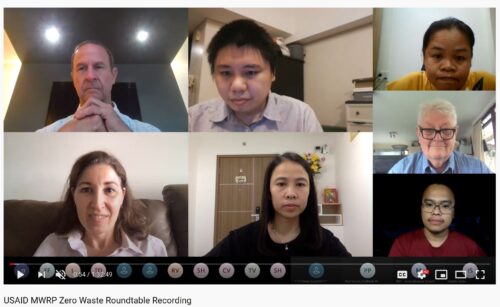USAID Municipal Waste Recycling Program Zero Waste Roundtable

The Global Alliance for Incinerator Alternatives (GAIA), a USAID grantee and leader in the approach, defines “zero waste” as “significantly reducing — and eventually completely eliminating—the amount of resources that we send to disposal.” Mike Alino with GAIA says zero waste is a goal, “something we should aspire to.”
This spring, the USAID Municipal Waste Recycling Program (MWRP) organized a roundtable with five grantees from the project countries to discuss best practices in introducing and implementing “zero waste” models. The grantees — Divers Clean Action (DCA), GAIA – Philippines, GreenViet Biodiversity Conservation Centre (GreenViet), Mother Earth Foundation, and Yayasan Pengembangan Biosains dan Bioteknologi (YPBB) — gathered to share successes, challenges, and ideas for replication. Approximately 55 participants joined the event.
The zero-waste model, as outlined by GAIA, has ten components: source separation, door-to-door collection, composting, recycling, reuse/repair/deconstruction, waste reduction initiatives, economic incentives, residual separation and research facilities, better industrial design, and interim landfills. Grantees are mostly focused on the first four components in partnership with local governments, civil society organizations, waste collectors, households, and businesses, including recyclers, waste banks, and zero waste businesses. During the discussion, grantees suggested two approaches to successfully implement a zero-waste model:
- Create a decentralized approach to waste management: Mother Earth Foundation in the Philippines is localizing the collection and management of plastic waste, residual waste, and organic waste of Batangas City. This project is based on grantee’s experience in Tacloban City, where it successfully invested in improved waste collection and community composting facilities for each barangay (i.e., neighborhood). Tacloban’s decentralized initiative has led to an efficient and well-organized waste management system, with the city saving on costs of hauling waste to distant dumpsites. The diversion rate of waste from landfilling rose from 10 percent in 2017 to 55 percent by the end of 2018. The authorities in Batangas are noticing the improvements and have committed to sustaining separation of waste at source as part of the decentralized approach.
- Ensure collaboration between different stakeholders: Strategic partnerships between the public sector, private sector, and other actors are critical to funding and sustaining waste management projects. GreenViet, working in Hoi An City in Vietnam, found it beneficial to sign memoranda of understanding with different stakeholders in the waste management system—the People’s Committee, city environmental offices, trash collectors, and plastic producers—to establish official partnerships and foster accountability. Similarly, Divers Clean Action, working in the Thousand Islands in Indonesia, built a multi-stakeholder forum to help coordinate efforts among stakeholders. DCA is also supporting local officials with hiring private sector actors to carry out waste management tasks the local governments do not have the capabilities to undertake. YPBB and Mother Earth Foundation are ensuring that independent waste collectors are formalized into the waste management sector and have platforms to voice their zero waste recommendations and insights.
Grantee challenges with the zero-waste model center around budgetary constraints and government capacity limitations, which are often interconnected. Grantees noted that local and national governments sometimes lack the financial resources to properly implement zero waste approaches.
YPBB, for example, noted that the Bandung Environmental Agency is not heavily involved in waste collection and therefore a formalized waste management approach would prove to be an additional expense to the government. DCA noted that waste management falls under the purview of various government agencies and a lack of coordination among the agencies can lead to inefficient spending, as well as missed learning opportunities, duplication of efforts, and gaps in service delivery.
GreenViet, Mother Earth Foundation, and GAIA found that involving government officials in conversations helps to resolve some of these issues. Grantees recommended sharing “big picture” information with government officials to emphasize the high-level benefits of zero waste and the potential costs to human health with improper waste disposal. Mother Earth Foundation suggested these tactics would help reframe zero waste projects so that they are viewed by government officials as an investment rather than an expense. Moreover, the grantees found it important to improve cross-agency coordination through fora and discussions to streamline waste management systems and improve zero waste funding, policymaking, decision-making, and implementation.
For individuals or organizations seeking to replicate the zero-waste model in their own cities, GAIA stresses the importance of collaborating with policymakers and recommends:
- Mandatory source separation: Ensuring governments have policies in place that mandate waste to be separated at source to prevent contamination of high-value recyclable materials and to support proper disposal.
- An annual budget for solid waste management resources: Making sure there is funding for initial investments in zero waste and a dedicated solid waste management office within government entities and dedicated personnel handling waste management, including waste collectors and policy enforcers (e.g., environmental police). The savings in collection, haulage, and disposal costs outweigh the initial investments. If the budget to assist independent waste collectors is too low, GAIA suggests user fees from households and businesses to collect the needed revenue.
- Waste reduction measures, including composting: Ensuring there are diversion/recycling targets for the city and processes put in place to regulate single-use plastics. Supporting composting also significantly reduces the costs of hauling waste to landfills and the amount of waste to manage in those landfills.
- Supporting independent waste collectors: Independent (usually informal) waste collectors are frontline workers and one of the pillars of the zero waste approach. They have seen all the problems, so their insights are invaluable. It is important to incorporate them in solid waste management committees.
Watch the event recording here.
USAID’s Municipal Waste Recycling Program (MWRP) is designed to reduce land-based sources of ocean plastics pollution in Indonesia, the Philippines, Sri Lanka, and Vietnam. Various MWRP project grantees across the four countries are introducing circular economy principles in municipal solid waste management by piloting zero waste approaches.

